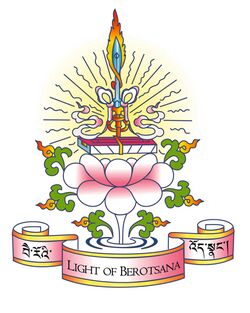Light of Berotsana
In 1959, tens of thousands of Tibetans fled their homeland seeking refuge from violence, oppression, and annihilation. Though in great danger, many took precious moments to pack sacred texts, which they then carried with them as they walked over the Himalayan mountains to India. Limited to a few items, often they chose books over food. Such cherished words must warrant our attention and be preserved and disseminated in as many languages as possible. At Light of Berotsana, our focus is to translate from the Tibetan into English texts on Buddhism and Tibetan culture and, in general, to encourage the translations of these texts into many languages. Because no one currently speaks the language spoken by the Buddha, without translation, what would we know of his teachings? Without translation, how can we take those precious words to heart, practice for the benefit of all sentient beings, and become enlightened? Without translation of the poetry and epic tales of Tibet, how will we understand the rich Tibetan culture that developed over the centuries?
To that end, the Light of Berotsana Translation Group was formed in the spring of 1999 by Lama Chöying Namgyal, Sangye Khandro, and Jules B. Levinson with the view to further the study and preservation of the vast Tibetan Buddhist literary tradition. Currently, Lama Chönam and Sangye Khandro are the primary translators associated with Light of Berotsana. As we grow, we will invite additional qualified translators and teachers to join in our work. From our own experience, we know the road leading to expertise to be both long and demanding; so with a view to the future, we presently devote a significant portion of our time to teaching the Tibetan language—as well as the art of translation itself—to aspiring translators.
Primarily, our translations include the most pertinent texts taught in the colleges, training centers, and retreats of the Nyingma Tibetan Buddhist tradition. These commentaries and treatises serve as foundations for the rich cultural heritage of the Tibetan Buddhist tradition, an erudite and exacting system of inquiry into the nature of reality and the acquisition of knowledge.
As Tibetan Buddhist studies gain prevalence outside of Tibet and especially throughout the West, it is necessary to translate the texts that will thoroughly elucidate the philosophy, knowledge, and ideals that have guided Buddhist study throughout its history. Such education rests upon reliable translations that will support sustained study. The Light of Berotsana Translation Group seeks to bring such study within the reach of English-speaking students with precise, inspiring, and accurate translations of a full range of significant texts. In selecting texts from the course of studies followed at eminent schools for Buddhist learning, we will emphasize depth of exposition alongside relevance for contemporary scholars and students. At present, we are focusing upon the work of illustrious Tibetan scholars such as omniscient Lonchenpa (1308-1363), the vidyadhara Jigme Lingpa (1730-1798), Dodrupchen Jigme Tenpa’i Nyima (1865-1929), Heruka Dudjom Lingpa (1835-1904), Ju Mipham Rinpoche (1846-1912), Kyabje Dudjom Rinpoche, Jigdrel Yeshe Dorje (1904-1987), and Kyabje Dungsai Thrinley Norbu Rinpoche.
We humbly seek to provide the resources necessary for those who speak and read the English language to immerse themselves in the study of Buddhist literature and Tibetan civilization, and we are intent upon bringing the many treasures of Tibet’s literary heritage within reach of the global community.
Not only was the unsurpassed Longchen Rabjam one of the most prolific Buddhist authors of the 14th century, he was a fully realized practitioner who relied on his own incisive knowledge to compose many unparalleled shastras or enlightened commentaries. He composed the Seven Treasures as his crowning achievement, and the Jewel Treasure of the Dharmadhatu is the pinnacle of them all. This astonishing masterpiece sets forth the structure and practice of the Great Perfection path known as trekcho, cutting through to original purity. The root verses are presented in poetically rhythmic, profound, and alluring verses that have been recited from memory by distinguished Dzogchen masters of the Great Perfection lineage for centuries up to the present time.
This publication also includes Omniscient Longchenpa’s autocommentary called A Treasury of Citations, which is an indispensable guide to the root verses that are woven throughout this shastra, to illuminate how they refer to the context of the ground, path, and fruition, as well as the view, meditation and conduct of this exceptional Great Perfection path. True to the title, this commentary disseminates the most crucial information by citing the original speech of Buddha Vajradhara found in the seventeen Great Perfection upadesha tantras, as well as including many quotations from the sutras, tantras, and shastras in general. In short, for trekcho and togal practitioners of the quintessential Heart Essence cycle of Atiyoga, this text clarifies the necessary stages to realize and accomplish complete enlightenment in a single lifetime, at the moment of death, in the dharmata bardo, or in a natural nirmanakaya pure realm. (Source: Berotsana Publications)
Pages in category "Light of Berotsana"
This category contains only the following page.

